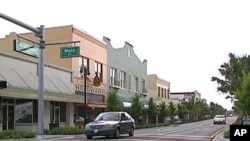Florida's so-called Space Coast has three very famous residents about to retire -- the Space Shuttles Endeavour, Discovery and Atlantis.
It's the sort of city that has a small-town America feel -- with summertime fun. And for decades, the skies offered another spectacle.
Titusville, Florida is part of the so-called Space Coast. It sits along the Indian River Lagoon, directly across from NASA's Kennedy Space Center.
"Well, Titusville is the birthplace for space. We've had rockets leave from the Kennedy Space Center, which is about 9 miles east of here, since the beginning of the space program, so space and Titusville are interrelated," said Mark Ryan, Titusville's city manager.
That theme is evident in this city of 45,000 people. "If you want to call us a company town, we are a company town. There are a lot of folks who have grown up with the space program and have had family members and parents and grandparents who work out there," Ryan said.
With NASA retiring its 30-year-old shuttle fleet, many locals are worried.
"This community revolves around the space program. I know there's a lot of people in my particular community that work at the space center. Without the space center, there's going to be a lot of missing jobs," said Space Coast resident Mike Barker, who owns Space Walk of the Space Coast offering festival amusements.
But the space center is not going away just because the shuttle program is ending. "Kennedy Space Center is not closing. It is a new direction on how America is going to get into space. We're going to rely on the commercial space transportation," Ryan said.
The space shuttle program has cost more than $113 billion, and NASA can not afford to develop new spacecraft technology while maintaining the shuttle fleet. NASA's new focus is developing the next generation of spacecraft.
Bob Kirk has worked in commercial real estate in Titusville for 45 years -- almost as long as the Kennedy Space Center has been on Florida's east coast.
"It's just really a sad thing to see this happen, and I'm losing so many friends out of Titusville because of the layoffs," Kirk said.
The roughly 1,000 NASA employees currently designated to work on the shuttle program will shift to other assignments at NASA. But thousands of others could lose their jobs.
"It's going to be a four or five year rough go, and a lot of the guys are not going to be able to stay here to do it. There are so many houses now that are vacant and so many more after this next week. I was here in 1972 when they laid everybody off, again in 1986, and it's been quite a story here, but we just struggle and make it work," Kirk said.
1972 marked the end of the Apollo lunar missions. Nine years passed before the next manned spacecraft was on the launch pad. After the Shuttle Challenger exploded shortly after liftoff in 1986, the shuttle fleet was grounded for nearly three years.
"We need to have systems that we can afford to fly, not just for NASA, but for the military and for commercial, so that the Space Coast can again be that vibrant place that we all know it can be,"
said Lori Garver, NASA's deputy administrator.
The space shuttle era ends with the landing of the shuttle Atlantis.




